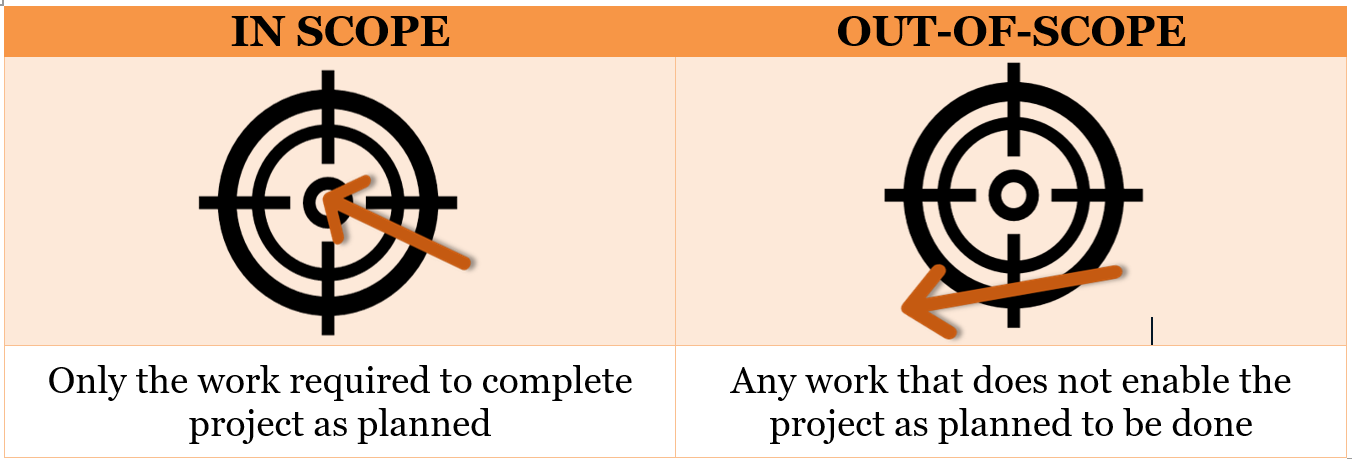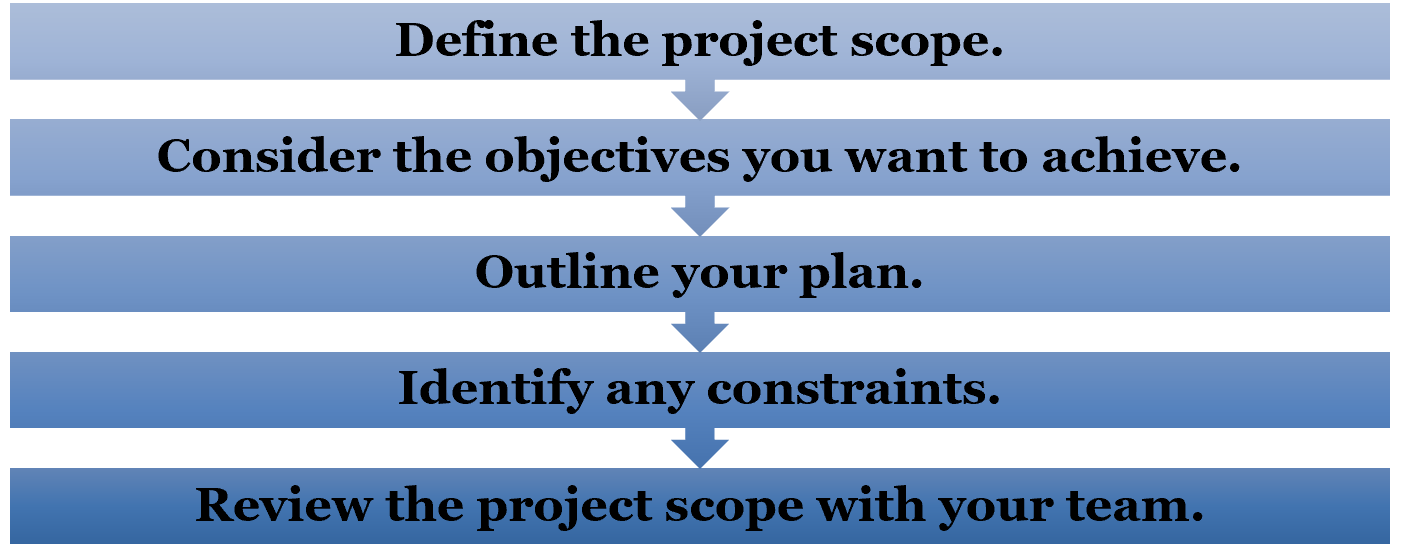Everything is ready for your Project Kick Off: a scope statement, a defined process for approvals, a documented change process, and a detailed Work Breakdown Structure (WBS). Everything will go exactly as planned from Day One, right? Uh, likely not. Project Managers have to manage the change requests guaranteed to come from the start. The skill of managing change requests is known as “managing scope” and being good at that can protect the project manager and the performing organization. Managing Project Scope effectively can also keep your projects out of the 71% that fail.
On this page:

What Is “Project Scope”
Let us look to our industry standard, the Project Management Book of Knowledge (PMBOK) for the definition of Project Scope:

As your Project Management experience grows, you will likely find yourself responding to change requests, if only with your inner voice and informally, as “in-scope” or “out-of-scope.” It is not the size of a change request that marks it as “in” or “out,” but rather the potential impact that it can have on deliverables. And if you respond to every change request as “NO! OUT-OF-SCOPE!” your project management career journey will be brief.

Simply put, managing project scope is ensuring all of the required work and only the required work necessary to complete the project is accomplished (PMI, 2004, p103).
Why Does It Need “Managing”?
If it was easy as telling everyone that submitted a change “nope, not going to happen” well then, we would not need scope management skills and more than 29% of projects would be a success. In the Project Management Institute article, Scope Change Control: Control Your Projects Or Your Projects Will Control You!, the Project Management author shares than a lack of Project Scope Management leads to projects stalled or destroyed by:
- The whims of stakeholders and project team members
- Stakeholders with bad memories about what was (or was not) in scope
- Stakeholders with good memories that know exactly what was originally approved but choose not to remember
- Great ideas that can have serious consequences to the project’s schedule, cost, and final benefit
How many of those things have you already experienced? Some of us have had many of those happen within the same project! Without a doubt, change will happen, and some changes are necessary and helpful. Other changes will lead to disaster. A Project Manager’s role is not one of halting any and all changes; rather, with training and experience, managing the change process to ensure positive opportunities are not missed and extraneous efforts do not derail the work.
Some changes occur outside of formal change requests. Consider the changes in remote teamwork resulting from Covid-19 precautions; Project Managers could not simply say “nope, our team has to continue working in the same office regardless” but rather within different constraints, they had to find new ways to foster collaboration and maintain productivity. Managing scope well enables you to guide the project work through different types of changes.
Studying for the PMP Exam?
How Do You Manage Project Scope?
The full breadth of Managing Project Scope practices and tips is beyond this article. The Project Management Institute (PMI) alone offers ~ 5,000 results on the topic. Interestingly, the #1 U.S. job site (as of SimliarWeb rankings 08.10.2020) provides a powerful Project Scope Management guide for Project Managers; it is indicative of the significance and industry-agnostic importance of the scope management skill set that it is included in career sites. The full Project Scope Management guide provides specifics such as how to scope a project as shown in this excerpt:

When Do You Manage Project Scope?
This is an easy one: throughout the entire project. As seasoned Project Managers will share, someone is always asking for a change. If you can not manage the scope, then the changes will populate and the project’s risk of failure can expand accordingly.
What skills are needed to manage project scope?
Because changes come from Clients, Customers, Team Members, and Stakeholders, Project Managers should develop several interrelated skills to manage scope. Consider these training resources:
- Work Breakdown Structure (WBS)
- Managing Client and Stakeholder Expectations for Project Managers (from an IT perspective)
- Strategic Planning and Thinking for Project Managers
Knowing how the WBS can be used as a road map to help ensure project success. In conjunction with tools like the WBS, Project Managers need soft skills around negotiation and setting expectations. And to balance both the technical and soft skills, Project Management benefit from training in strategic planning and thinking.
Managing Project Scope: What’s Good for Your Project Is Good for Your Career
In addition skill training, consider Project Scope Management guide’s tips:
- Dedicate a few days to the development of the project scope.
- Maintain consistent communication.
- Be conscious of necessary changes.
With quality project management training, proven tools, strong documentation, and vetted processes you can manage scope so that your stakeholders maintain their support of the project and your team is able to stay on track.
Upcoming PMP Certification Training – Live & Online Classes
| Name | Date | Place |


 New Horizons
New Horizons
 Project Management Academy
Project Management Academy
 Six Sigma Online
Six Sigma Online
 TCM Security
TCM Security
 TRACOM
TRACOM
 Velopi
Velopi
 Watermark Learning
Watermark Learning
 Login
Login




 New Horizons
New Horizons
 Project Management Academy
Project Management Academy
 Velopi
Velopi
 Six Sigma Online
Six Sigma Online
 TCM Security
TCM Security
 TRACOM
TRACOM
 Watermark Learning
Watermark Learning